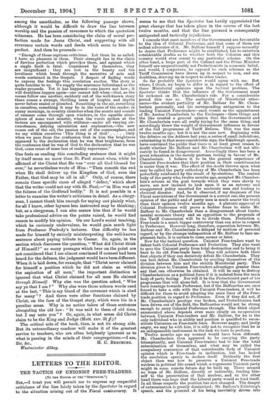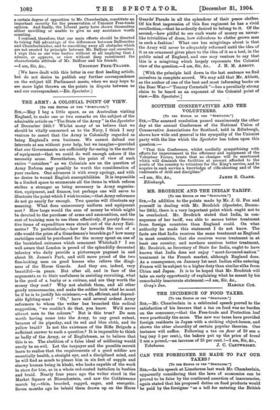[TO THE EDITOR OP THE " SPECTATOR." j SIB,-4 trust
you will permit me to express my respectful criticisms of the line lately taken by the Spectator in regard to the situation arising out of the Fiscal controversy. It seems to me that the Spectator has hardly appreciated the great change that has taken place in the course of the last twelve months, and that the line pursued is consequently antiquated and tactically injudicious.
I concede that most members of the Government are favourable to the idea of Colonial Preference, and that some of them are ardent advocates of it. Mr. Balfour himself I suppose earnestly to desire that Preference might be established, but to entertain considerable doubts as to whether both the Colonies and this country would ever assent to any particular scheme. On the other hand, a large part of the Cabinet and the Prime Minister himself are unquestionably not Protectionists in economic belief, and would, I conjecture, be opposed to such schemes as the Tariff Commission have drawn up in respect to iron, and are doubtless, drawing up in respect to other trades. So far probably the Spectator would agree with me. But where, I think, we begin to differ is in regard to the effect of these Ministerial opinions upon the tactical problem. The Spectator thinks that the influence of the Government must be reckoned on Mr. Chamberlain's side. For a considerable period_ this was so. The ambiguity of Ministerial utter- ances—the evident partiality of Mr. Balfour for Mr. Cham- berlain personally, and his corresponding antagonism to the leading Unionist Free-traders—such events as the appointment of Mr. Austen Chamberlain to the Exchequer—these things and the like created a general opinion that the Government and Mr. Chamberlain were all really trying for the same thing, and accordingly threw the weight of Government influence in favour of the full programme of Tariff Reform. This was the case twelve months ago; but it is not the case now. Beginning with the debates on the Address last year, a series of small indications, culminating in that more considerable sign, the Edinburgh speech, have convinced the public that there is at least great reason to doubt whether Mr. Balfour and Mr. Chamberlain will not ulti- mately be found in disagreement. Accordingly there has been a great relaxation in the merely partisan feeling in favour of Mr. Chamberlain. I believe it to be the general experience of Unionist Free-traders that their position in their constituencies is easier than it was. The effect of the doubt thrown upon what may be called the party orthodoxy of Mr. Chamberlain has been powerfully reinforced by the result of by-elections. The central body of the party who, twelve months ago, accepted Mr. Chamber- lain's scheme as the goal towards which they were slowly to move, are now inclined to look upon it as an extreme and exaggerated policy unsuited for moderate men and leading to electoral disaster. And, be it observed, if my diagnosis of the Fiscal convictions of the Government is a correct one, the present. opinion of the public and of party men is much nearer the truth than their opinion twelve months ago. A platonic approval of Colonial Preference will prove a feebler force to unite Mr. Balfour to Mr. Chamberlain than a disagreement about funda- mental economic theory and an opposition to the proposals of the Tariff Commission will be to divide them. Protection v.
• Free-trade is a much bigger controversy than can arise in respect to Preference. However long, therefore, separation between Mr. Balfour and Mr. Chamberlain is delayed by motives of personal . regard, or by the strange indisposition of Mr. Balfour to face un- pleasant facts, it is certain to come sooner or later. Now for the tactical question. Unionist Free-traders want to defeat both Colonial Preference and Protection. They also want to save the Unionist party from total destruction and to bring it back to its old Free-trade basis. They will achieve both their first objects if they can decisively defeat Mr. Chamberlain. They can best defeat Mr. Chamberlain by availing themselves of the division between him and the strictly Ministerial party. This division gives to Unionist Free-traders advantages greater than any that can otherwise be obtained. It will be easy to destroy Chamberlainism as a political force if it is isolated from the main body of party feeling. Nor will it be the Protectionist part of his programme that will alone fall. It is true that the Government have leanings towards Preference, but if the Balfourites are once forced to take a side with the Unionist Free-traders, it will be difficult for them to avoid adopting the main lines of the Free- trade position in regard to Preference. Even if they did not, if Mr. Chamberlain's prestige was broken, and Protectionism had been driven out of the field, the Balfourites would not be strong enough to carry Colonial Preference through. The third object enumerated above depends even more clearly on co-operation between Unionist Free-traders and Mr. Balfour, for he is the only individual who in ability and position is qualified to recon- stitute Unionism on Free-trade lines. However angry, and justly angry, we may be with him, it is silly not to recognise that he is an indispensable instrument in the task we have to perform.
Twelve months ago my counsel would have been different. Mr. Chamberlain then appeared to be carrying the party triumphantly, and Unionist Free-traders had to fear the total extermination of themselves, and what may be called the compulsory conversion of that considerable body of Unionist opinion which is Free-trade in inclination, but has lacked the resolution openly to declare itself. Evidently the first object then was how to preserve a Unionist Free-trade nucleus in political life round which a regenerate Unionist party might in some remote future day be built up. There seemed no hope of Mr. Balfour, directly or indirectly, lending him- self to the preservation of that nucleus, and on the other hand there was hope that the Liberal party would so lond itself. In all these respects the position has now changed. The danger of extermination is greatly diminished; Mr. Balfour's Edinburgh speech, and the prospect of his being inevitably driven into
a certain degree of opposition to Mr. Chamberlain, constitute an important security for the preservation of Unionist Free-trade opinion. And finally, the Liberal party have shown themselves either unwilling or unable to give us any assistance worth counting.
I contend, therefore, that our main efforts should be directed to taking full advantage of the differences between Balfourites and Chamberlainites, and to smoothing away all obstacles which are not created by principle between Mr. Balfour and ourselves. I urge this as our wise tactics without at all implying that I admire, or approve, or view without deep resentment the characteristic attitude of Mr. Balfour and his friends.
—I am, Sir, &c., UNIONIST FREE-TRADER.
[We have dealt with this letter in our first leading article, but do not desire to publish any further correspondence on the subject till Parliament meets, when we may hope to see more light thrown on the points in dispute between us and our correspondent.—En. Spectator.]



































 Previous page
Previous page